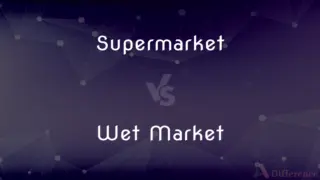Job Costing vs. Process Costing — What's the Difference?
By Tayyaba Rehman — Published on November 15, 2023
Job Costing allocates costs to individual units or projects. Process Costing divides costs evenly across units produced in continuous processes.

Difference Between Job Costing and Process Costing
Table of Contents
ADVERTISEMENT
Key Differences
Job Costing is a method used in accounting and management to calculate the costs associated with a specific job or project. This system is especially useful when a company offers products or services that are uniquely tailored or varied. Job Costing is relevant and highly beneficial in industries where work is undertaken based on customer-specific orders or where projects differ in their requirements and scope.
On the other hand, Process Costing is implemented in manufacturing and other processes where units are produced in a continuous flow. It is predominantly used in industries where identical or similar products are produced on a mass scale. Process Costing evenly divides all costs incurred in the manufacturing process over the number of units produced, providing a per-unit cost that is averaged across all units.
Job Costing requires meticulous tracking of all costs tied to a specific job. It is paramount in scenarios where each job or project has distinctively different materials, labor, and overhead costs. Under Job Costing, each job gets its individual cost ledger or report, aiding in precision in profitability analysis and pricing strategies, especially in sectors like construction or custom manufacturing.
In contrast, Process Costing accumulates all costs in a particular production process and averages it out over all units. It is vital where goods are mass-produced, and each unit is expected to bear an equal share of the total cost. Process Costing takes into account the entirety of costs in a production process over a specific period and divides it, providing a per-unit cost that aids in pricing and inventory valuation in industries like consumer goods manufacturing.
While Job Costing is applicable and relevant in industries where work is project-based and every project is distinct, its meticulous and detailed nature of cost allocation might be unsuitable for mass production. The method excels in scenarios where customization or differentiation is key and where tracking individual project costs is pivotal for financial management and pricing.
ADVERTISEMENT
Process Costing, with its averaged out cost approach, does not lend itself well to projects or jobs where there is significant variation in production requirements or customer specifications. It is apt for scenarios where a singular, continuous production process yields a uniform output, and where detailed tracking of individual unit costs is neither practical nor financially viable.
Comparison Chart
Applicability
Custom, distinct projects
Mass production of identical items
Cost Allocation
Costs are traced to individual jobs
Costs are averaged over all produced units
Industries
Construction, custom manufacturing
Consumer goods manufacturing, refineries
Precision & Detail
Detailed, precise cost allocation
General, averaged cost allocation
Unit Cost Variability
Can vary significantly between jobs
Remains consistent across units
Compare with Definitions
Job Costing
Job Costing is applicable for custom orders.
Job Costing allowed the bespoke furniture maker to price each piece accurately.
Process Costing
Process Costing averages costs over units.
Process Costing helped the candy factory ascertain the cost per chocolate bar.
Job Costing
Job Costing tracks costs per individual project.
Using Job Costing, the construction project's total expense was meticulously calculated.
Process Costing
Process Costing divides total costs by output quantity.
The oil refinery used Process Costing to price its petroleum per gallon.
Job Costing
Job Costing segregates each project’s financials.
With Job Costing, the consultant could differentiate costs between client projects.
Process Costing
Process Costing applies to mass production industries.
Process Costing enabled the soda company to maintain consistent per-unit pricing.
Job Costing
Job Costing aids in precise pricing strategies.
Job Costing enabled the event planner to quote prices based on specific event costs.
Process Costing
Process Costing is suitable for consistent production.
Process Costing allowed the paper mill to evaluate average production costs.
Job Costing
Job Costing involves detailed cost ledgers.
The film production utilized Job Costing to manage its diverse expenses.
Process Costing
Process Costing provides a general per-unit cost.
Through Process Costing, the car manufacturer determined an average cost per vehicle.
Common Curiosities
Is Job Costing suitable for mass production?
Typically no, Job Costing is better suited for industries with custom, distinct projects or jobs.
What is Job Costing’s primary purpose?
Job Costing is utilized to calculate and track costs related to specific, distinct jobs or projects.
How does Process Costing manage costs?
Process Costing averages the total costs over the number of units produced, providing a per-unit cost.
How detailed is cost tracking in Job Costing?
Job Costing involves meticulous, detailed tracking of all costs tied to a specific job or project.
Is Job Costing practical for industries like consumer goods manufacturing?
Not typically, as Job Costing is generally more applicable in project-based industries.
How does Process Costing affect unit cost?
Process Costing results in a consistent average cost per unit across all produced items.
Is Process Costing applicable for custom manufacturing?
Usually no, Process Costing is more suitable for industries involving continuous, mass production.
How does Job Costing affect profitability analysis?
It provides detailed insight into each job’s costs, aiding in precise profitability analysis.
When is Process Costing typically implemented?
Process Costing is used in industries producing identical or similar goods in a continuous flow.
Can Job Costing aid in pricing strategies?
Yes, Job Costing enables precise pricing strategies by accurately tracking individual project costs.
Does Process Costing cater to individual project tracking?
No, Process Costing focuses on averaging costs across units in continuous production processes.
Share Your Discovery

Previous Comparison
A4 Paper Sizes vs. Letter Paper Sizes
Next Comparison
Supermarket vs. Wet MarketAuthor Spotlight
Written by
Tayyaba RehmanTayyaba Rehman is a distinguished writer, currently serving as a primary contributor to askdifference.com. As a researcher in semantics and etymology, Tayyaba's passion for the complexity of languages and their distinctions has found a perfect home on the platform. Tayyaba delves into the intricacies of language, distinguishing between commonly confused words and phrases, thereby providing clarity for readers worldwide.












































